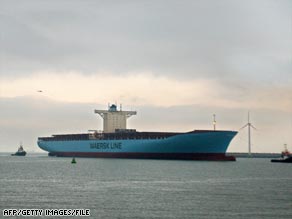
Pirates near Somalia’s coastline attacked a cargo ship Wednesday with a crew of at least 20 U.S. nationals, according to the company that owns the vessel.
It is believed that the U.S.-flagged Maersk Alabama then was hijacked, according to a statement from Maersk Line Ltd. If so, it would be the sixth hijacking over the past week. The vessel was en route to Mombasa, Kenya, when it was attacked about 310 miles (500 kilometers) off Somalia’s coast, the statement said. U.S. government sources said the attack happened at about 7:30 a.m. local time. The nearest U.S. Navy warship was about 300 nautical miles, or 345 miles, away at the time, they said. The U.S. Navy issued another notice Tuesday warning mariners that the Somali piracy activity was extending hundreds of miles offshore. A Maersk subsidiary in Norfolk, Virginia, owns and operates the cargo ship, Maersk spokesman Michael Storgaard said. He would not provide any details about the security arrangements on board the Maersk Alabama. “We have very strict policies on the vessel. … Crews are trained to handle these types of situations,” Storgaard said from Maersk’s headquarters in Copenhagen, Denmark. He said the company is in the process of contacting the crew members’ relatives and setting up assistance for them. “That is at this moment our primary concern,” Storgaard said.
Don’t Miss
U.S. warns of dangers off Somalia coast
Pirates seize British cargo ship in Gulf of Aden
U.S. Navy detains, releases six suspected pirates
Japan destroyers set sail on anti-piracy mission
The Maersk Line is one of the U.S. Department of Defense’s primary shipping contractors. But Storgaard said the Maersk Alabama was carrying “general cargo,” most likely including aid supplies to East Africa. No action has been taken so far against the pirates, according to a spokesman for the U.S. military’s 5th Fleet in Bahrain. “There is a task force present in the region to deter any type of piracy, but the challenge remains that the area is so big and it is hard to monitor all the time,” 5th Fleet spokesman Lt. Nathan Christensen said. He said U.S.-flagged ships are not usually escorted by the military unless they request it from the U.S. Navy. Recent attacks off Somalia’s coast, which have taken place south of the area patrolled by U.S. and coalition ships, show pirates are changing their tactics and taking advantage of tens of thousands of square miles of open water where fewer military ships patrol, according to U.S. military officials. “They [pirates] are going where we are not; they are looking for targets where there is limited coalition presence,” according to a U.S. military briefing document shown to CNN. Coalition ships mainly patrol in the busy sea lanes of the Gulf of Aden between Yemen and northern Somalia as ships come out of and head toward the mouth of the Red Sea. “Despite increased naval presence in the region, ships and aircraft are unlikely to be close enough to provide support to vessels under attack. The scope and magnitude of the problem cannot be understated,” according to a Navy news release.